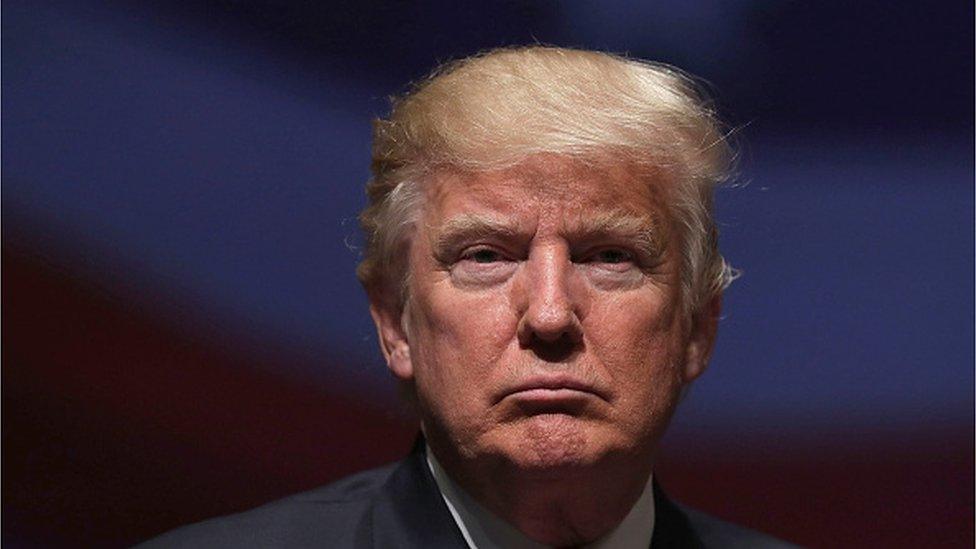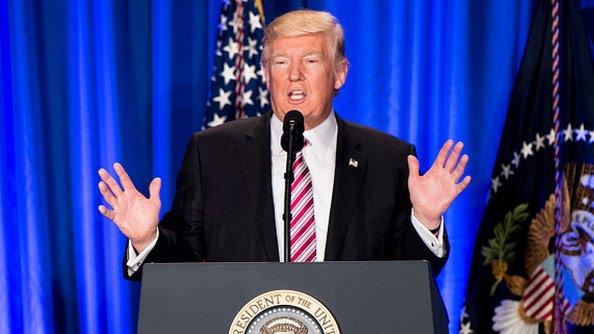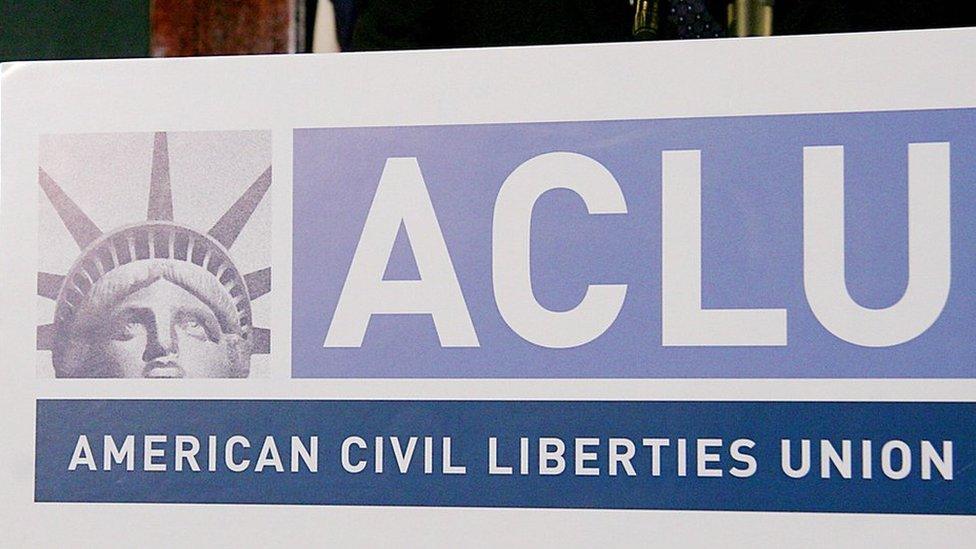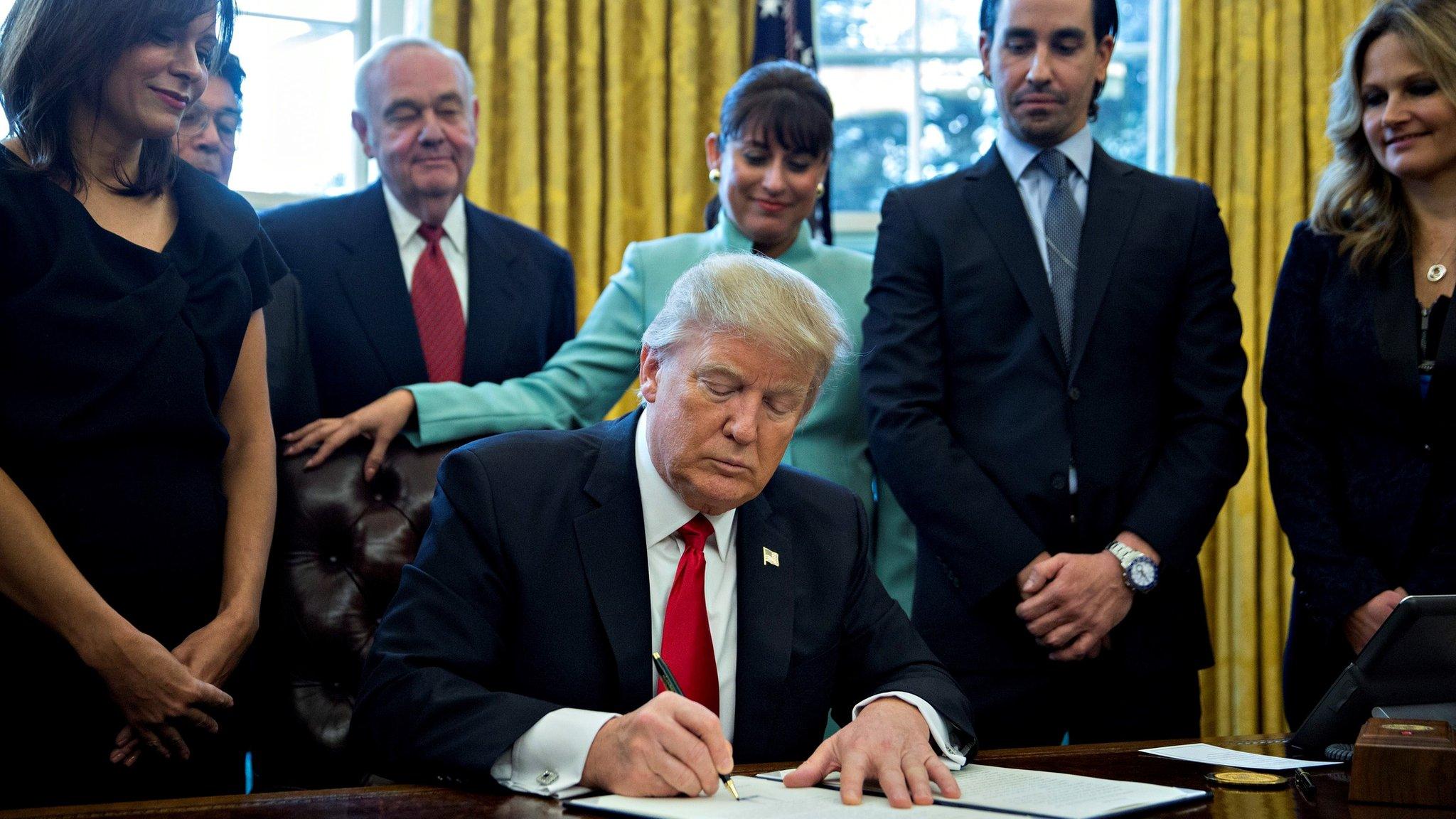Trump orders review that could relax Dodd-Frank bank rules
- Published

US President Donald Trump has taken his first step to try to scale back US financial services regulations.
He signed an executive order to review the 2010 Dodd-Frank financial regulations, which some people on Wall Street say are overly-restrictive.
The law was brought in after the 2008-09 financial crisis with the aim of avoiding another financial meltdown.
"Dodd-Frank is a disaster," Mr Trump said earlier this week.
He added: "We're going to be doing a big number on Dodd-Frank."
Mr Trump made it a campaign pledge to repeal and replace the Dodd-Frank act, which also created the Consumer Financial Protection Bureau (CFPB).
This US government agency seeks to make sure banks, lenders, and other financial companies treat US consumers fairly.
Dodd-Frank, named after the Congressmen who campaigned for the legislation, was introduced to rein in banks' risky practices by banks and other financial companies.
Democrat congressman Jim Himes told the BBC: "Dodd-Frank of course was the legislative response to the economic carnage that came about because of the financial meltdown of late 2008.
"Much of the legislation... is designed to get at those things which went horribly wrong, that is to say, problems in the mortgage market" he said.
Good move, bad move
But Trump administration officials have said Dodd-Frank did not achieve what it set out to do, and argue that is an example of government being overly-controlling.
News that a review was imminent sent banking shares higher on Wall Street and on the main stock markets in Europe. Goldman Sachs and JP Morgan Chase rose 4% and 3% respectively.
"The banks are going to be able to price products more efficiently and more effectively to consumers," Gary Cohn, an adviser to Mr Trump and a former Goldman Sachs executive, told the Wall Street Journal.
Market analyst Jasper Lawler at the London Capital Group said that "unwinding some of Dodd-Frank is a good thing because it will enable smaller community banks to compete, offering competition to consumers."
But he said that scrapping the whole of Dodd-Frank "puts the entire system at risk of a repeat of 2008".
And Sweden's minister for financial stability Per Bolund told the country's TT news agency that a repeal would be "dangerous, harmful and extremely unfortunate".

What is Dodd-Frank?
The 2010 Dodd-Frank act was introduced to address "too-big-to-fail" banking
The law forced US banks to reduce their reliance on debt for funding
Banks had to craft "living wills", or blueprints for winding them down in a crisis
Dodd-Frank created the Financial Stability Oversight Council
The Council seeks to identify risks and promote market discipline
The law also had a big consumer protection element
It created a new agency, the Consumer Financial Protection Bureau, to oversee consumer financial products
This gave regulators new powers over large non-bank financial companies
Dodd-Frank is named after Democrats Christopher Dodd and Barnett "Barney" Frank, who pushed the law through Congress

The executive order directs the Treasury secretary to consult members of different regulatory agencies and the Financial Stability Oversight Council, and report back on potential changes.
Mr Trump also signed a presidential memorandum instructing the Labor Department to delay bringing in an Obama-era rule requiring financial professionals to put their clients' interests first when giving advice on retirement investments.
The rule, which was set to take effect in April, will be delayed for 180 days while it is reviewed.
The so-called "fiduciary rule" was aimed at blocking financial advisers from steering clients toward investments with higher commissions and fees that can eat into retirement savings.
Critics say the rule limits retirees' investment choices by forcing asset managers to steer them to low risk options.

So long Dodd-Frank? By Michelle Fleury, BBC Business Correspondent
The landmark legislation was introduced to make sure a financial crisis like the one we saw in 2008 could never happen again. It sought to end banks that were 'too big to fail' and promote financial stability.
Its supporters argue it did just that. Some banks may still be big but they are not too big to fail. The law took away the authority to provide another bailout. And there are now more consumer protections in place.
But the legislation is not without its flaws.
The Dodd-Frank act may have been aimed at Wall Street but it hurt Main Street too. Community banks struggled to comply with the laws many new rules.
Trump administration officials say it is an example of too much government intervention.
The law is not perfect. But whether the financial system will be safer depends on what comes in its place.

Mr Trump is also meeting with his business advisory group of senior US executives on Friday.
It will be the first meeting of the Strategic and Policy Forum, a group of executives that includes Jamie Dimon, of banking giant JPMorgan Chase, and Mary Barra chief executive of carmaker General Motors.
Travis Kalanick, the chief executive of ride-sharing service Uber, stepped down from the economic advisory group after strong criticism from staff and the public.
Mr Trump tweeted on Friday, external: "Meeting with biggest business leaders this morning. Good jobs are coming back to US, health care and tax bills are being crafted NOW!"
Oil and gas rule
Also on Friday, the Senate voted to stop a regulation that would have required oil and gas companies to disclose payments to the US or foreign governments for commercial development.
The House of Representatives approved the measure this week, and Mr Trump is expected to sign it.
Republicans said the regulation gives foreign competitors valuable information about US firms.
Democrats said getting rid of the requirement means big companies will be able to hide questionable dealings with foreign governments like Russia.
- Published3 February 2017

- Published1 February 2017

- Published30 January 2017
